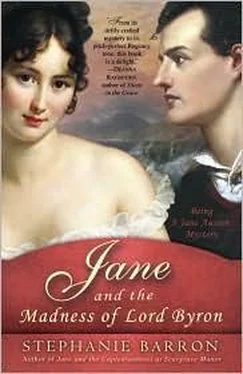Whimsical indeed, to demand quiet in a publick house, and chuse the haunt of cavalry officers for his writing-room. However, in Byron’s world the hubbub of the Arms—so different from the genteel drawing-rooms of his usual circle—might seem to promise anonymity. Until Caro Lamb appeared on the scene, and forced him to fly.
“Mr. Laidlaw, I suppose, did not mention a disturbance in the night—as tho’ a heavy load of baggage was carried past his door?”
“Mr. Laidlaw takes laudanum,” Tolliver replied heavily, “and sleeps with a green eyeshade, and his ears plugged up with beeswax. A dreadful light sleeper, Mr. Laidlaw is, and a martyr to it, in publick places—and so he never retires but with his precautions , as he calls ’em. It was the first thing I asked him, after poor Mary carried in the coffee to Lord Byron’s rooms—her meaning to lay the fire, not knowing as his lordship had quitted the place, her sleeping out at her mother’s. It was Mary found that unfortunate lady sewn up in the hammock, and she screamed so loud not even Mr. Laidlaw’s beeswax could preserve him. But he declared as he’d heard nothing—not even Lord Byron’s valet, packing up of his traps.”
“When does Mary lay the fires?”
“Around eight o’clock, on the mornings after Assemblies—the patrons preferring a bit of a lie-in, from being out so late.”
And Lord Byron, at eight o’clock, had been waving farewell to Scrope Davies in Church Street. It was probable, however, that Catherine’s body had arrived at its resting place hours earlier. There were still five hours, between Byron’s seeking his bed and mounting his horse, when his lordship might have been anywhere—but was the publick house open to his use all that time?
“After his lordship quitted the place, with his dunnage, I am sure nothing would do for Mrs. Tolliver but to bar all the doors!” I told the landlord in amusement. “I should never risk a second disturbance to my sleep, having the considerable cares of a publick house to manage on the morrow.”
“That she did, ma’am, and was that full of wrath she even cleared the Ordinary—tho’ there was some as were disposed to give her lip about it. But, there, we’ve been and owned the Arms for donkey’s years—and nothing no officer of the 10th can say will ever discompose Mrs. Tolliver. She’s turned the Regent himself out of the premises, when he was but a stripling prince, and if Royalty must give way to Mrs. Tolliver, there’s not much else that shan’t.”
“Very proper,” Henry opined. “I admire her pluck. And so the doors were barred from the moment his lordship left—around half-past one, I think it was said at the Inquest. And you opened the house … at what hour?”
“Cock-crow,” Tolliver said promptly, “which is round about five o’clock in May; tho’ nobody’d come knocking at the back door—meaning such of the servants as sleeps out of the house, which is most of ’em—until six o’clock. I’m a fair man, for all I’m so pressed with custom, and don’t ask even them as works for me to be abroad afore daylight.”
“And yet,” I persisted, with an air of feminine bewilderment, “poor Miss Twining’s body materialised upstairs sometime between the hours of two and … let us say eight, despite the fact that the outer doors were barred!—For she was certainly seen alive in the grounds of the Pavilion at a quarter to two, and cannot have met her death any earlier. You did not detect a forcing of your doors, Mr. Tolliver, I presume?”
“No, ma’am.”
If my questions were beginning to appear too pointed, the good publican failed to take umbrage. He appeared as genuinely puzzled as I, regarding the murdered body in the bed.
“Might the kitchen doors have been left ajar?” I wondered. “A very daring and reckless murderer might be moved to take his chance—and carry Miss Twining’s shrouded form up the servants’ back stairs.”
“But Nance, the scullery maid, sleeps on a pallet next to the hearth,” Tolliver countered, “and the rogue should be forced to step over the girl to reach the stairs, even if she did neglect to bar the back door, which I doubt. Nobody could’ve mounted those stairs, without Nance screaming fit to bust, of ghosts and demons in the night. No, I’m afraid there’s only one way possible that corpse found its way into Lord Byron’s bed—and that’s from the use of the tunnel, what my old dad, God rest his soul, swore was filled in when the Prince established Mrs. Fitzherbert in her villa, and left off his rakehell ways.”
I stood rooted to the spot, unable even to risk a glance at my brother Henry. A tunnel ? Good God!
“A tunnel,” Henry said flatly. “There is a tunnel leading into the Arms?”
“Long since filled in, as I thought, and never used in thirty year or more,” Tolliver rejoined. “It was Miss Austen’s word as made me think on it— materialised , she said, as if that unfortunate young lady’s remains jest floated up like a ghost! Many’s the time my brother and me used to frighten the folk upstairs, when we were young, with a clanging bit o’ chain and a sheet over our heads—jumping through the panel in the dead of night and howling so’s to turn the blood cold. Our dad had our hides for it, of course, but that never stopped Sam—he’s my brother, and saw worse every day in the Peninsula. A rifleman he is, now.”
“A panel,” I repeated, as tho’ possessed of a weak understanding.
Tolliver nodded. “Comes right out beside the chimney stack in the middle bedchamber, as is unused at present. You are welcome to look at it, if you like—having an interest in old publick houses, as you do, ma’am.”
He led my stupefied brother and myself immediately upstairs, Henry ducking to avoid collision with the low ceiling of the staircase. At the far end of the upper passage was a closed door—which must give on to Lord Byron’s old bedchamber. I should dearly love to have a look round it; but Tolliver turned immediately into a doorway on our left: one of the middle bedchambers, its fellow being across the hall.
A pleasant-enough room, low-ceilinged like the rest, coated in plain white plaster with two small windows offering a view of the Marine Pavilion. The wainscoting was oak, and reached halfway up the walls, with a frieze of sporting dolphins carved along its upper edge. In the middle of the wall to our left sat the hearth—which was narrower than those in the publick rooms below; the stack, however, must serve both storeys, and run from the cellars to the attics.
Tolliver winked at us, crossed to the panelling on the right-hand side of the chimney, and pressed one of the carved dolphins. An entire section of panelling swung outwards, like a servant’s door; narrow and not above four and a half feet in height—but an opening nonetheless.
“There,” he said. “The Regent’d never fit through it, now.”
“It was made for him?” Henry said.
“Aye, so he could come and go without the world observing him, whenever the need for a lightskirt or a dozen bottles of claret should take him and his disreputable friends. There was never anything like ’em for raking the night away—those Barrys—Cripplegate, Hellgate, and Newgate as they called ’em! And Sir John Lade, what married a Covent Garden doxy! And that George Hanger!—He’s the only one the Regent will keep by him, now.”
I stepped forward and gazed down; a winding stair descended into darkness.
“Is the whole of the publick house familiar with its existence?”
Tolliver slapped his thigh. “Not even my wife is aware! Have a fit of hysterics on the subject of burglars, Mrs. Tolliver would, if she knew there was a secret way inside the Arms. And as I said—my old dad insisted it’d been filled in long since. I haven’t given it a thought since I was a boy, and Sam ran off to take the King’s shilling.”
Читать дальше












